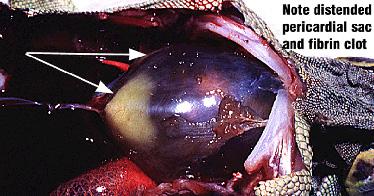Difference between revisions of "Lizard Cardiovascular Disease"
Jump to navigation
Jump to search
(Redirected page to Reptile Cardiovascular Disease#Lizards) |
|||
| (One intermediate revision by the same user not shown) | |||
| Line 1: | Line 1: | ||
| − | + | {{review}} | |
| + | Cardiovascular disease may be primary or secondary. | ||
| + | [[Image:Cardiovascular_lizard.jpg|400px|thumb|right|(Copyright © RVC)]] | ||
| + | |||
| + | '''Aetiology''' - it may be infectious, parasitic, congenital or nutritional (e.g. calcification of large vessels) | ||
| + | |||
| + | '''Clinical signs''' - Clinical signs of cardiovascular disease are usually non-specific such as anorexia and weight loss. Signs such as swelling in the area of the heart, peripheral oedema and ascites warrant investigation of the cardiovascular system. | ||
| + | |||
| + | '''Diagnosis''' | ||
| + | *History | ||
| + | *[[Lizard Physical Examination|Physical examination]], especially auscultation | ||
| + | *Blood culture | ||
| + | *Radiography | ||
| + | *Ultrasound | ||
| + | *Doppler flow detector | ||
| + | *Electrocardiography though interpretation may be a problem | ||
| + | *[[Lizard Necropsy|Necropsy]] | ||
| + | |||
| + | '''Treatment''' - Includes supportive treatment, antimicrobial if infectious, and correction of [[Lizard Husbandry Requirements|husbandry]]. | ||
| + | |||
| + | ==Literature Search== | ||
| + | [[File:CABI logo.jpg|left|90px]] | ||
| + | |||
| + | |||
| + | Use these links to find recent scientific publications via CAB Abstracts (log in required unless accessing from a subscribing organisation). | ||
| + | <br><br><br> | ||
| + | [http://www.cabdirect.org/search.html?q=(((title:(heart)+OR+ab:(heart))+AND+(title:(lizard)+OR+ab:(lizard)+OR+od:(lizards))+AND+sc:%22ve%22))+OR+(((title:(lizard)+OR+ab:(lizard)+OR+od:(lizards))+AND+(subject:(cardiovascular+diseases)+OR+subject:(cardiovascular+system+diseases)+OR+subject:(cardiology)+OR+subject:(cardiovascular+disorders)+OR+subject:(heart+diseases)+OR+subject:(vascular+diseases)+OR+subject:(circulatory+disorders)+OR+subject:(circulatory+diseases))+AND+sc:%22ve%22)) Lizard Cardiovascular Disease publications] | ||
| + | |||
| + | [http://www.cabi.org/cabdirect/FullTextPDF/2007/20073287994.pdf '''Approach to the exotic cardiology patient.''' Rishniw, M.; Australian Small Animal Veterinary Association, Bondi, Australia, 32nd World Small Animal Veterinary Association Congress, Sydney Convention Centre, Darling Harbour, Australia, 19-23 August 2007, 2007, pp unpaginated, 31 ref. - '''Full Text Article'''] | ||
| + | |||
[[Category:Lizard_Diseases|C]] | [[Category:Lizard_Diseases|C]] | ||
Revision as of 14:11, 2 November 2010
| This article has been peer reviewed but is awaiting expert review. If you would like to help with this, please see more information about expert reviewing. |
Cardiovascular disease may be primary or secondary.
Aetiology - it may be infectious, parasitic, congenital or nutritional (e.g. calcification of large vessels)
Clinical signs - Clinical signs of cardiovascular disease are usually non-specific such as anorexia and weight loss. Signs such as swelling in the area of the heart, peripheral oedema and ascites warrant investigation of the cardiovascular system.
Diagnosis
- History
- Physical examination, especially auscultation
- Blood culture
- Radiography
- Ultrasound
- Doppler flow detector
- Electrocardiography though interpretation may be a problem
- Necropsy
Treatment - Includes supportive treatment, antimicrobial if infectious, and correction of husbandry.
Literature Search
Use these links to find recent scientific publications via CAB Abstracts (log in required unless accessing from a subscribing organisation).
Lizard Cardiovascular Disease publications

